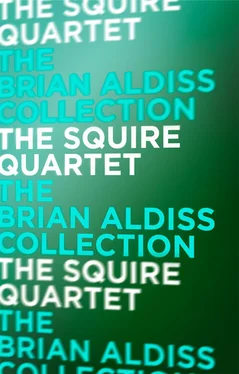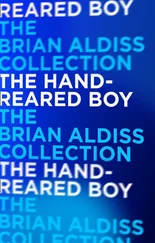As delegates poured from the hall, Selina Ajdini was waiting among the ferns of the marble gallery. She advanced towards Squire, travel bag thrust forward, smiling and holding out her hand. Her big blue-rimmed spectacles still on her nose made her eyes – of a much more elusive shade of blue – look large and defenceless.
‘Mr Squire, we have not met and it is my great pleasure that we do so now; I attended your Pop Expo in London a decade ago, and marvelled like everyone else. It is wonderful that you came to Ermalpa. My name is Selina Ajdini and I am Associate Professor in Comparative Stylistics at the University of the Gulf in Galveston, Texas. This year I have a sabbatical in Europe East and West, with a roving commission for the Frankfurt-am-Main magazine Die Spitze.’
Seen close to, she looked older than Squire had estimated. Probably in her forties.
‘I used to know Ted Zold, head of the English department at Gulf.’
And no less attractive for that.
‘Ted’s retired just this year. He’s working on the Yale edition of the correspondence of Howard Dean Efflinger.’ She spoke English without an American accent, rather with some kind of European intonation Squire could not place. Her voice was pleasant – if ‘pure and clear as a mountain stream’, then the associations with the hare bone picked bare on the headland were still present in Squire’s mind. Her lips were thin and coral pink; they moved delightfully, whatever she was saying. He transferred his gaze to the blue eyes; the diatribe against Huxley had left him too affronted for any ready supply of conversation.
She was presenting her credentials in a sophisticated way, chatting about an acquaintance of his whom she had met in Budapest. She punctuated her talk with ‘Thank you’, and ‘You’re very kind’ to delegates who, passing by, felt compelled to offer her congratulations on her speech. This she did without in any way dissipating the impression that she was deep in conversation with the man she regarded as most important. The leather travel bag, turning gently on the left hip, touched Squire’s right thigh; the slender hand with the scarlet nails, adorned additionally with a slender silver and a fat amber ring, remained grasping the callipygous leather.
‘You are part of the reason I am in Ermalpa, Mr Squire, and I hope that maybe we could get together this evening and you would allow me to interview you for Die Spitze? They plan a special number for the spring on Contemporary Thinkers. You probably know that “Frankenstein Among the Arts” has been running on German television earlier this summer.’
‘I never give interviews,’ he said, smiling to break the force of the words.
She yielded gracefully, smiling in return so that the coral lips parted on pretty white teeth. ‘I understand. Perhaps we could talk anyway and I could indulge in a little hero-worshipping over a drink or two.’
‘That would be pleasant.’
The slender hand came out. ‘Seven o’clock then, in the bar.’
He made off towards the dining room palming his hair into place, gripping his briefcase tightly under one arm. ‘Acting out prophetically the effete culture of the West …’
Most of the tables in the dining hall were already fully occupied.
Courtesy demanded that he should not appear to show preferences at this early stage of the proceedings. He made himself sit at the nearest table. In some respects, it looked the least inviting, in that the two Russians were seated there with the secretary, Gianni Frenza, and two other delegates whose names Squire did not know.
He took hold of the back of the spare chair and smiled questioningly, with a gesture of the hand. All five rose or just failed to rise in polite fashion. As he seated himself, Frenza introduced him formally to the two Russians, Georgi Kchevov with the gold-rimmed spectacles and rugged looks – close to, his rough red skin and blunt nose made him look even more an inhabitant of trucks rather than classrooms – and the white-haired Vasili Rugorsky.
Frenza then introduced the other two men as delegates from the Federal Republic of Germany, Frank Krawstadt and Herman Fittich. Both smiled and shook Squire’s hand. Krawstadt was an untidy wiry man of perhaps thirty-two with a straggle of yellow beard and a raw spotty face, the very opposite of the spruce young Italians.
Herman Fittich was a more comfortable figure in his early fifties, with white sideboards to his hair; he wore a neat grey suit. Although his face and manner were bland, Fittich gave Squire an appraising look as he shook hands. Apparently satisfied with what he saw, he remarked in perfect English, ‘This is a time when we are apt to lean a bit heavily on compliments, but I’m perfectly genuine when I say that I have long appreciated many aspects of your work. You’re learned but you’re also kind to your readers. You permit us the luxury of a low boredom threshold.’
‘Good of you to say so. If you like whisky, never get a teetotaller to write about it.’
Fittich chuckled. ‘I’m sure Humphrey Bogart couldn’t have put it fairer than that. Let’s call the waiter for you. The food’s good.’
‘It smells good.’
‘The dining room is as grand as the conference hall – a token of the esteem in which the sensible Italians hold the arts of the stomach,’ Fittich replied.
In honour of the conference, vases of flowers stood on small tables round the sides of the room. Carnations in silver vases stood on every table, next to the glasses containing upright packets of grissini.
Any formality these arrangements might have induced was dispelled by the waiters. They were encouragingly numerous, and in general broad-stomached middle-aged men with oiled black hair and docile countenances; they were supported by young eager men learning this most rewarding of trades. They moved with fatherly dignity, aware of their importance, and in no time a delicious soup was set before Squire, a roll of warm brown bread provided on his side-plate, and red wine and mineral water poured into the two glasses by his right hand.
‘We met once before in the Tate Gallery in London during March of 1970,’ said Rugorsky to Squire in slightly majestic French, as his Russian colleague, Fittich, and Krawstadt were picking up the threads of their previous conversation. ‘It was during the Richard Hamilton exhibition, and Leslie Lippard-Milne was showing me round. You have forgotten it.’
He regarded Squire steadily.
Although he had forgotten, Squire found the memory returned, so that he said, ‘Why, yes – and I even remember that we met in front of …’ Teresa had been with him then, wearing a smart new suit they had acquired in Mayfair, where they were staying at Brown’s Hotel; she had been so pleased with it that she had worn it immediately and had her old suit sent round to the hotel.
‘We were introduced in front of “Hugh Gaitskell as a Famous Monster of Filmland”, one of the early landmarks of pop art,’ Rugorsky said. ‘We talked about the insights to be derived from the commonplace – as you say, the feeling behind a banal phrase, or, as I say, the sense of evolution even behind very static things such as a multinational company or a bureaucracy.’
His eyelids were heavy and fleshy, in common with his face; they descended slightly as he spoke, masking his glittering eyes which nevertheless firmly maintained Squire’s gaze.
Squire remembered both the gaze and the man now, chiefly through his sly and testing sense of humour. Good mood restored, he said, ‘There’s also the emptiness behind a banal phrase to be considered. We may have problems, I think, in understanding the difference between banality and sincerity.’ The soup was delicious.
‘D’accord. Just as insight is not always found behind complex phraseology. There again we see the spoor of evolution – mankind invents all its many languages not only for communication, but also as anti-communication devices, to keep out strangers.’
Читать дальше












